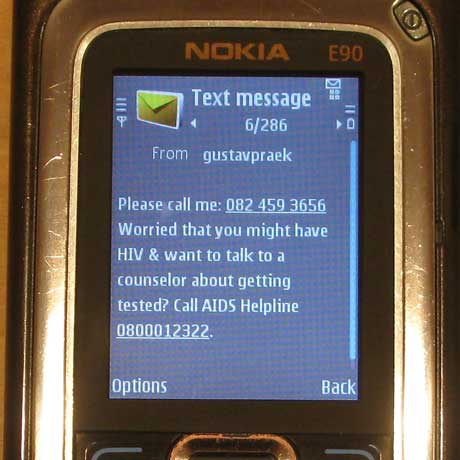
It is a problem that has taxed the world's leading scientific minds and its greatest doctors; some of the richest people on the planet have pumped billions of pounds into finding a solution.
But a new project aimed at curbing the spread of HIV in Africa has discovered that one of the most effective weapons is the humble text message.
Faced with 1,000 HIV-related deaths in South Africa every day, a global group of organisations has teamed up to create Project Masiluleke, which aims to increase HIV awareness, testing and treatment across Africa using mobile phones.
The first stage of the project – which has already shown remarkable results in early trials – involves sending out free text messages to millions of people every day urging them to call a confidential phone line if they have any concerns about HIV and Aids.
Pilot projects have seen immediate results, with a four-fold increase in the number of calls to the country's National AIDS Helpline and a significant response from target groups.
Future plans still under development include offering free home HIV testing kits, and using text messages to remind patients about their hospital appointments and keep them informed about their medical treatment.
"This is a critical effort," said Dr Krista Dong, an HIV and tuberculosis specialist and director of education group iTeach, which is one of Masiluleke's backers.
Speaking at the launch of the project at the Pop!Tech conference in Camden, Maine, Dong said that the need for innovative approaches to the crisis was urgent.
"With hundreds of thousands of people suffering and dying, it's no longer a question of 'should we do this?' or even 'how should we do this?'. It's 'how fast can we do this?'."
Finding new ways to educate the public about HIV and Aids is an important issue for a country that has failed to stem the rapid growth of infection.
South Africa has a huge problem, with infection rates averaging almost 11% across the country. In areas such as the eastern province of KwaZulu-Natal, where Project Masiluleke is based, the numbers are even more shocking: one in six people has HIV, and up to 40% of pregnant women carry the virus.
Despite the high prevalence of Aids, only 5% of people in the country have ever been tested for the virus – mostly when they were already in the advanced stages and close to death. Men in particular are a problem group, because the powerful social stigma associated with being found HIV positive means they refuse to visit clinics.
The organisations backing Project Masiluleke said text messaging was being used because mobile technology is so pervasive in South Africa and remains private. At least 90% of people carry a mobile there, and phone adoption is also growing rapidly across the rest of the continent, potentially allowing similar schemes to be rolled out easily in other Aids-affected countries.
"Because there's a phone in almost every family, we really have almost universal coverage, so it's an ideal opportunity for us to drive testing." said Gustav Praekelt, director of the Praekelt Foundation, a South African non-profit organisation involved in the scheme.
"The other important thing is because of the scarcity of other services in Africa and South Africa, it's become a central component for people to get access to information, entertainment, medical care and banking services."
The scheme has support from a wide group of organisations, including the Pop!Tech conference organisers, American innovation group Frog Design and African phone network MTN. The scheme's backers hope that Masiluleke, which means "lend a helping hand" in Zulu, will eventually start to have a noticeable effect on infection rates because it offers a combination of intimacy and privacy.
"In a country where it is so obvious that we are challenged by HIV, you would think there would be enough knowledge to help people to either access care or change behaviour," said Zinny Thabete, an HIV campaigner with iTeach.
"But people do not want to go to their clinics to access care … People fear who's going to see them and what's going to be said about them."

